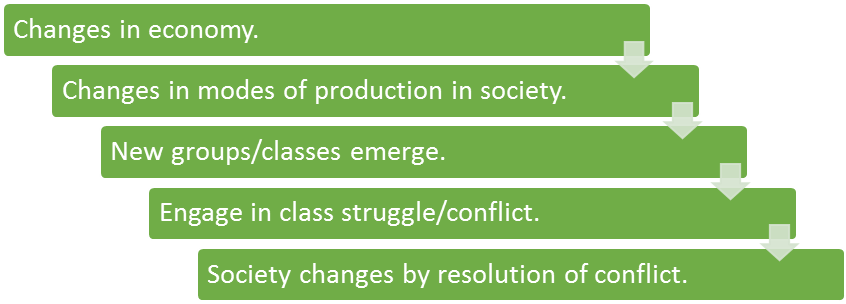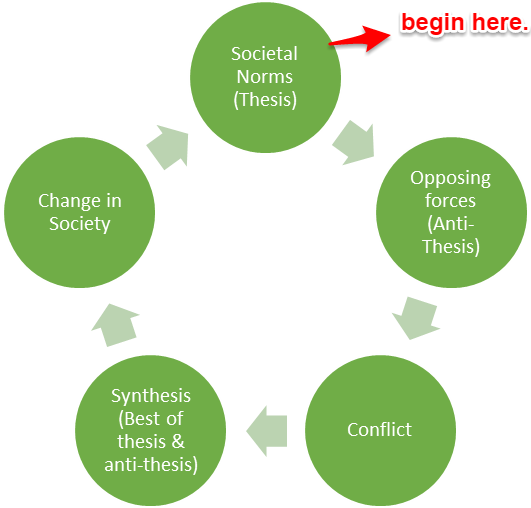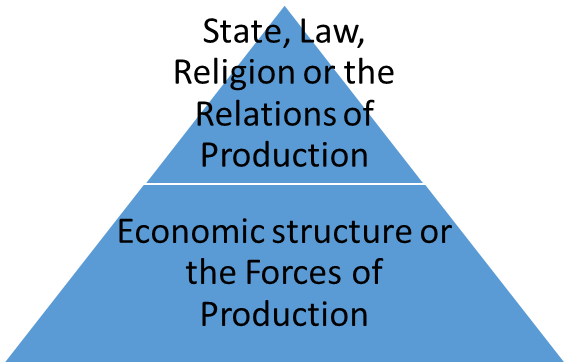Table of contents
Didn’t really see himself as a sociologist, rather a revolutionary scholar. He believed that change was inevitable and his ideas are arranged so as to explain his view point. It was later sociologists who found materials of sociological relevance in Marx’ works.
Historical Materialism
Marx didn’t directly coin the term. It was introduced later by Engels. Marx himself wrote about the materialistic interpretation of history, which was later defined properly by Engels and Plekhanov.
Historical Materialism holds that all the important changes that have occurred in the course of history have occurred because of economic changes in society, changes in the modes of production and exchange. Historical materialism also deals with the further changes in social structure, the emergence of classes and their subsequent struggle against each other.

Historical materialism was the synthesis of two prominent thoughts of the 19th century:
- Hegelian Idealism. (Thesis + Anti-thesis = synthesis) Hegel’s idealism was all about the superiority of the human spirit (Geist) and how its evolution led to change in society.
- 18th century Materialism. Materialism, on the flip side, was at the opposite end of the spectrum and maintained that the world is made up of matter and humans are just passive recipients of the vagaries of this material nature.
Marx synthesised these two streams of thought and said it was not the consciousness of men that determines their being (ref: idealism), rather it was their social being that determines their consciousness (ref: false class consciousness).
Using Historical Materialism
Marx said that neither of the original theses (Idealism and Materialism) were correct and that man (a highly evolved form of matter) exists in an active relationship with matter around him. Man is a creative being and transforms his surroundings to suit his needs. He does this through labour, which Marx calls production. In the process of transforming nature, man gets transformed himself.
As old needs are satisfied, new needs emerge, thus change is a fundamental part of society. Marx here borrows Hegel’s idea of change. He says that change is a dialectic process .

Modes of Production
Marx said that in the social production that men carry on, they enter into definite relations that are indispensable and independent of their will. These relations of production correspond to a definite stage of development of their material powers of production. The sum total of these relations of production constitutes the economic structure of society, the real foundation on which rises the legal and political superstructures and to which correspond definite forms of social consciousness. These modes of production in material life determine the general character of social, political and spiritual processes of life. At a certain stage of their development, the material forces of production come into conflict with the existing relations of production and with that which is but a legal expression of the same thing, the property relations within which they had worked before. From forms of development of the forces of production, these relations turn into fetters, then comes the period of social revolution.
In this definition Marx talks about two things:
- Forces of production. (FoP) Labour, skill, capital, technology and raw materials.
- Relations of production. (RoP) Made up of the technical division of labour and the relations of control over the workplace.
Marx further says that the nature of relations of production depends on the level of development of the forces of production. Also, these FoP and RoP together make what Marx calls the economic base or modes of production in society.
Marx once famously said, the windmills gave the feudal lords, it is the steam engine that gave the capitalists.
Development stages of powers of production

Marx in his writings alluded to the economic substructure and the superstructure of the state, made up of social, political and spiritual beliefs. He held that the superstructure was influenced by the base alone. That is, it was a one way influence.
Marx’s idea was that the superstructure is in place to preserve the base. When the base outgrows the superstructure a period of struggle would emerge, (dialectic process of change) eventually leading to social revolution. A new superstructure would emerge which would aim to preserve the new base by crafting new laws, societal norms, religious guidelines.
Marx further said that revolution would not arise till the time the deprived classes don’t develop a subjective awareness of the objective realities. That is to say they become a class for itself.

In the previous feudal society the deprived class, the bourgeoisie, was a minority itself and did not become a class for itself. The process of change was slow eventually leading to the formation of capitalistic society. But Marx said that in the capitalistic society the proletariat should not wait for a gradual change but develop a subjective awareness of the objective conditions and precipitate change through revolution.
Critique:
This has been criticised as a prefabricated theory. His ideas about primitive communism, ancient society, and feudal society were well analyzed but he forced the revolution as the only solution for the contradictions of the capitalist society.
Class and Class Struggle
Class is a concept used by Marx to explain intergroup dynamics involving conflict and change.Class refers to a group of people similarly related to the forces of production and hence sharing common economic interests. The two classes in any society are the ownership class (preserving order class) and non ownership class (changing order class). In the sociological sense, class accounts for conflict and change.
Origins of Class
In primitive communism, the society was a subsistence type. With the advent of better agricultural practices, surplus in production emerged. Some people appropriated the surplus to the exclusion of others. Thus emerged the two class phenomena which according the Marx has dominated all our history.
ANCIENT | Master and slaves. |
FEUDAL | Lords and serfs. |
CAPITALIST | Bourgeoisie and proletariat. |
According to Marx, in feudal society the conflict was between two minorities (nobility and bourgeoisie) while in the capitalist society the conflict is between the majority (proletariat) and the minority (bourgeoisie).Due to the appropriation of surplus by the ownership class, Marx holds that exploitation is in-built in class divisions.
Emergence of Class Conflict
Marx says that there exist contradictions within capitalist society which would hasten the revolution.
- Pauperisation - Progressive immiseration of middle class and workers due to infinite greed of capitalists. Also the frequent booms and slumps often lead to recessions which cause further pauperisation of the workers. Example of covid lockdowns where the working class lost their livelihoods while capitalists benefited from the relaxed fiscal policy of the government.
- Homogenisation - With monopolies, capitalists become homogenised and as working conditions become increasingly similar, workers also get homogenised.
- Polarisation - Due to pauperisation of middle class, eventually the society would be polarised in two classes, bourgeoisie and proletariat with everything in between moving into either of the two classes. (Thinning of the middle class)
Social revolution would lead to the destruction of private property, which Marx holds is the cause of class divisions in society.
- This would mean:
- Society collectively controls production.
- No more profit motive. Classless society.
- To each according to his needs, from each according to his ability.
- Initially it would be a dictatorship of the proletariat, but eventually the state would wither away and a classless society would emerge.
- Classless society means no nation-states, which implies no conflict.
Critique
- Weber removed his extremes and supplemented his theory.
- Marx: class results in economic inequalities. Income was not the criteria but RoP.
- Weber: Class based on market economy. Weber accepted division but said they only occur in market economies, in ancient and feudal societies it was status difference.
- While Marx's historical materialism said that change in economic structure was the only cause of change in society, Weber in his study of protestant ethic pointed out that ideas could also lead to change.
- Charismatic leadership could also lead to change. Ex Ghandi.
- Weber also questioned Marx’s idea of polarization. He said that the objective reality pointed to a proliferation of classes. Weber pointed out 4 classes in capitalist society:
- Propertied upper class.
- White-collar middle class.
- Petit bourgeoisie.
- Manual workers.
- While Marx talked about polarisation and how the petty bourgeoisie will fall in the proletariat over time, Weber held that:
- White-collar middle class would increase
- No homogenisation as the skilled workers would not join the unskilled.
- Marx said that in a classless society all inequality would be removed. Weber said till the time bureaucracy is present inequality of power will remain even if everyone has equal pay.
- Bernard & Kerr put forward the embourgeoisment thesis. They said that the working class would progressively become bourgeois due to increasing technological advances.
- Marx extrapolated the trends of his time. Didn’t account for the rise of welfare state.
- Marx proposed a revolution by the proletariat. Lenin lead a revolution of the Bolsheviks (a minority party) and Mao led a peasant uprising (Marx always claimed that peasants would not be able to become a class for themselves as they did not experience the alienation caused by capitalism as they lived in the idiocy of rural life).
- Ralf Dahrendorf said that Marx’s ideas only valid for 19th century. We now live in a post-capitalistic society. he said that society is an Imperatively Coordinated Association (ICA) with a hierarchy structure. Class is any group in conflict, which leads to redistribution of authority in the ICA. Thus conflict is institutionalised in society. He gave the reasons for this as:
- Decomposition of capital. Earlier owners were also managers. Now a separate managerial class exists. Nature of conflicts today are labour-management conflicts. Disputes are authority centered and not ownership centered.
- Decomposition of labour. Increasing social mobility. Expansion of middle class. Emergence of welfare state. Unskilled, semi-skilled, and skilled labour.
- Dual to the rise of the managerial middle class, Marxian class structure is no longer relevant as the middle class possesses characters of both bourgeoisie and proletariat.
AR Desai’s use of Historical Materialism
Desai explains that India was not a nation, in the European sense of the word, before the British arrived. Nationalist feeling developed because of the anti-colonial struggle.The advanced British changed the nature of the Indian economy to maximise profits, established central rule, revenue settlements, commercial farming, means of communication, etc. to facilitate the same. This resulted in the growth of new classes which were opposed to the British interests. Thus, changes in the economy became the cause of rise and development of Indian Nationalism.
NOTE: Early capitalism lead to the rise of nation-states. Neo-capitalism is now destroying the same idea due to globalisation. (Think about it, integration of economic regimes at first, followed by formation of larger communities like TPP, TTIP, RCEP, etc. and counter reactions in terms of insularity to the same)
Alienation
(This is young Marx, not the Marx who gave the theory of MoP, class, and class struggle)Alienation occurs when people are dissociated from their surrounding social environment. It implies a lack of integration and increased isolation.
When man loses control over his own labour due to the relations of production in capitalist societies he becomes alienated from himself.
Marx considered alienation to be socio-psychological phenomena. His thesis is as follows: In the beginning man is alienated from nature. Using his control over forces of production, he changes nature to gain control over it. Thus, alienation with nature declined and social alienation developed.
Marx believed that man alone was capable of labour and this was what separated him from other animals. Labour, according to Marx, is our way of expressing our humanity to others through creative expression. He gave the causes of alienation:
- As commodities become objects of trade, the worker has no control over what he produces as profit motive guides production.
- Earlier trade was a means to an end, now it had become an end in itself for the profit motive.
- All decisions about organisation of production are taken by capitalist. Labour ceases to offer any intrinsic satisfaction and becomes just a means of survival.
- Man distinguished from animals due to his ability to labour but after this objectification man loses his distinction and gets alienated from his own nature.
- In a capitalistic society, social relations are market relations and man is judged on his extrinsic worth rather than his innate human qualities.
- He further said that rural alienation cannot occur because rural people, due to their conformity to tradition, live in the “idiocy of rural life” and are thereby unable to become a class for itself.
Critique
- Weber disagreed and said that alienation is caused by the formalistic rationalisation of society and predominance of formal bureaucratic type societies. He said that compulsive conformity to impersonal rules renders people as mere cogs in a giant system and destroys their human qualities.
- C Wright Mills said that earlier skill with things were important. With the rise of the service sector, skill with people became more important. This lead to people becoming more manipulative, this lead to social life becoming a market of personality and development of false personalities by people. People practiced these false personalities so often that over time they lose touch with their real selves, thereby becoming self-alienated.
- Melvin Seeman defined alienation in industrial society on the basis of:
- Powerlessness.
- Meaninglessness.
- Isolation.
- Self-estrangement.
- Robert Blauner says that alienation also decreases with increasing control over work.
Marxist View of Deviance
Marx held that except primitive societies, all societies are classed. Thus, all laws (superstructure) are in favour of the ownership class. Even national interest is in favour of ownership class. Thus, any breach is deviant and is punished. Activities in favour of ownership class are never deviant and poor people pursuing even legitimate interests can be seen as a breach of law.
Thus, Marx concludes that blame is mis-attributed and as poor people are devoid of basic resources, crime is a way of survival. Society doesn’t fulfill the basic needs of the poor and put blame on the victims for deviance.
Marxist View of Division of Labour
Marx held that DoL occurs at two levels:
Social DoL | Economic DoL |
Totality of heterogeneous forms of useful labour. This is DoL in exchange and carried on independently by different producers. | Primarily found in capitalist societies. Production is a result of the effort of the collective worker. The individual contributes only partially. |
This is connected through exchange of commodities. | No exchange between workers. Each individual is but a part of the collective worker. There is only exchange between capital (wages) and labour (produce). |
Requires a wide distribution of means of production among a large number of producers. | Requires concentration of the means of production in the hands of the ownership class. |
Governed by chance and caprice. Free market. | Despotic in nature. Sole motive is profit. For profit the bourgeois promote specialisation even though it stunts and distorts human abilities. |
For Marx abolition of division of labour meant abolition of private property.
Previous Post